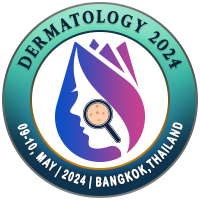
Bayu Prio Septiantoro
Kariadi General Hospital, IndonesiaTitle: Acneiform eruption related to 3+7 chemotherapy regimen for AML treatment
Abstract
Background: Chemotherapy is responsible for most skin manifestations experienced by cancer patients. Three days of daunorubicin and seven days of cytarabine for induction chemotherapy is known as a "3 + 7" regimen. Though skin manifestation in the form of acneiform eruption usually appears among patients administered EGFR inhibitors and monoclonal antibodies, it ca be experienced by those administered with daunorubicin or cytarabine. Case: A 19-year-old woman diagnosed with AML was admitted for chemotherapy with 3 + 7 (daunorubicin 45 mg/m2 for 3 days and cytarabine 100 mg/m2 for 7 days). After the first day of chemotherapy, acne appeared in the form of red spots in the face and getting heavier after completion of chemotherapy cycle extending to neck, chest, back and scalp with itch, pappules and erythema. She was diagnosed with acneiform eruptions. Discussion: Acneiform eruptions lesions usually appears in the form of monomorphic inflammatory mostly involving face, neck, chest and upper back which can expand to other than seborrheic areas. Some manifestations can help support potential relationship between acneiform and drugs administered. Those identified in this patient involving sudden onset of acne without history of acne vulgaris, monomorphic lesions with inflammation, lack of comedones and cysts. There are four classification levels for manifestation severity, in which patients with level III (severe) can be treated with oral clindamycin. Conclusion: In addition to EGFR inhibitors and monoclonal antibodies, daunorubicin and cytarabine can cause skin reactions in the form of acneiform. Further researches are needed to find out the causing agents and mechanism of these reactions.
Biography
Bayu Prio Septiantoro has completed his pharmacist degree at 2017 from Ahmad Dahlan University, Indonesia. He is the clinical pharmacist from department of pharmacy Kariadi General Hospital, Indonesia and he is continuing his master of clinical pharmacy degree at Universitas Gadjah Mada, Indonesia. His master's degree was funded by a scholarship from the Indonesian Ministry of Finance. He has over 5 publications. He and his colleagues are currently conducting research on herbal medicine for breast cancer which has been carried out since 2018.

